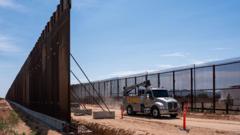Prime Minister Mark Carney revealed Canada will lift some retaliatory tariffs on U.S. imports, effective September 1, while retaining tariffs on autos, steel, and aluminum. This decision follows a phone conversation with U.S. President Donald Trump amid ongoing trade negotiations, aiming to bolster free trade derived from the USMCA.
Canada Eases Retaliatory Tariffs on U.S. Goods Amid Trade Negotiations

Canada Eases Retaliatory Tariffs on U.S. Goods Amid Trade Negotiations
In a significant move, Canada announces the reduction of retaliatory tariffs on U.S. goods while maintaining levies on key sectors, as trade discussions with the U.S. continue.
Canada has announced a strategic reduction of some of its retaliatory tariffs imposed on U.S. goods as part of ongoing trade discussions between the two countries. Prime Minister Mark Carney confirmed that these changes will take effect on September 1, focusing mainly on tariffs associated with the US-Mexico-Canada free trade agreement (USMCA). However, Canada will maintain its levies on crucial sectors such as automobiles, steel, and aluminum, indicating a cautious approach to trade relations.
The decision comes after Carney's first phone conversation with U.S. President Donald Trump since the two countries missed a self-imposed trade agreement deadline. Under previous conditions, Canada had set a 25% tariff on approximately C$30 billion (around $21.7 billion) worth of U.S. products, which spanned various categories from orange juice to washing machines, in retaliation for U.S. tariffs valued at 35% applicable to goods not compliant with the USMCA.
In a statement following the announcement, Carney expressed that this move aims to "re-establish free trade" for the vast majority of goods exchanged with the U.S., signaling an attempt to ease trade tensions while preserving Canadian interests. The White House responded positively to Canada’s decision, labeling it as "long overdue," and expressing eagerness for continued discussions on trade and national security.
Despite this easing of tariffs, Conservative leader Pierre Poilievre criticized the Prime Minister, suggesting the reduction signifies a capitulation to U.S. pressures. Carney defended his approach, highlighting Canada’s favorable tariff rates compared to other nations due to the USMCA, which places the effective tariff on Canadian goods at about 5.6%, significantly lower than the average 16% faced by other countries.
In light of these developments, both nations are expected to accelerate negotiations concerning automobiles, steel, aluminum, lumber, and additional critical sectors. Current tariffs imposed by the U.S. include a 50% levy on steel and aluminum imports from all countries except the UK, disrupting Canadian businesses that depend heavily on these sectors.
Economists warn that the ongoing trade disputes and tariffs are leading to significant disruptions within Canada, particularly in manufacturing, where job losses have already reached around 38,000 within Ontario's auto industry. As trade talks advance, both governments will need to navigate these complexities to achieve a mutually beneficial outcome.


















